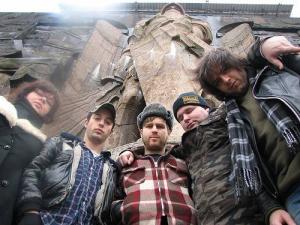
Toronto, ON's Fucked Up have become one of those rarities in modern music: a critically acclaimed hardcore punk act. Granted, they're one with enough creative flourishes to keep the adjectives flowing for days on end. Their first full-length, 2006's Jade Tree-released Hidden World, does exceed the 70-minute mark after all, and left various press pieces recommending it for fans of everyone from Black Flag and Negative Approach to Pink Floyd and the Who.
I spoke with rhythm guitarist Concentration Camp (Josh Zucker) and bassist Slumpy (Sandy Miranda) last Friday after the Brooklyn, NY stop of their ongoing U.S. tour, which also featured a set from partners in crime Career Suicide.
Pastepunk's Jason Bergman, who took the photos you see below, conducted an interview with frontman Pink Eyes (Damian Abraham) the same night, so be sure to check that out as well.
Obviously it took years for the band to deliver a proper full-length. In the 1980s hardcore bands would rarely put out full-lengths, but it was more due either to their own longevity or a lack of financial capability to stay in a studio for that long. Fucked Up has been around for years and in the 2000s no less, so what were your reasons for waiting so long on a full-length?
JOSH: It was pretty much just a matter of circumstance, actually. It wasn't a plan. We'd always planned to do a full-length -- it was just, circumstances were bad. We ended up [constantly] doing singles; that was just our writing style. We write two or three songs at a time; I guess we're just kind of impatient. We just wanted to release something as soon as we wrote them. It wasn't really anything more substantial than that. I don't think we were trying to make any kind of statement by just putting out 7-inches for a while.
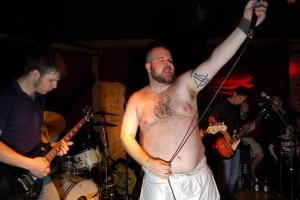 But it was kind of fun to do [the full-length]. It just kind of fit the pace of the band at that time.
But it was kind of fun to do [the full-length]. It just kind of fit the pace of the band at that time.
Do you think another full-length anytime soon is possible in between the constant vinyl releases?
SANDY: Yeah, after tour. Probably at the end of this year we're gonna start recording our second album. But I mean, since then we've released a few other records -- not full-lengths, but like, you know, today we had the Year of the Pig [12 inch]. But yes, there are plans for another one, and whether or not there are plans for one after that, we'll see.
Do you have any producers or recording studios in mind?
JOSH: We did our last one with this guy Jon Drew who's a friend of ours from Toronto, who's [an] engineer. But we pretty much produce all our own stuff. We've thought from time to time about bringing in a producer, but we haven't nailed anybody down.
SANDY: In a way, we know what we want. And if we had someone with the technical background to sort of achieve what we're trying to go for, then I don't really think there's a need for a producer at this time.
Hidden World as I'm sure you're aware has received a ton of press from relatively more mainstream outlets like Vice, NME, and such. Obviously this is quite unusual for a hardcore band. It even landed you that MTV Canada gig, and we could even go so far as to say it was unusual for Pitchfork Media to review the record. How do you feel about all this coverage?
SANDY: I don't know. Well, first of all, I don't know if I'd really consider or classify Hidden World to be a hardcore album. And I think because of its sort of crossover ability, that's kind of resulted in MTV Canada, or Vice [coverage], or what have you. It is kind of weird, but I guess because of the momentum we gained over the years of [solely] doing 7-inches, it piqued people's curiosity and that in itself became its own kind of news story.  Why do you think the press has flocked to you so hard and few, if any, others in the genre?
Why do you think the press has flocked to you so hard and few, if any, others in the genre?
JOSH: I guess it's because we write stuff that isn't so much following hardcore in Canada. I guess we kind of strove to do different hardcore. We're all into random kinds of music. Mike, our guitar player, is really into electronic/techno music and shit.
SANDY: But we all have backgrounds in punk, so that's where that root is. It's just that, as we've gotten older -- I mean, for me personally, I just kind of got bored with all the same kind of hardcore and punk that was coming out, so we just sort of…moved on.
JOSH: There's a lot of hardcore bands that'll cross over into weird different scenes, and the "Vice scene" or whatever is one we kind of fell into. I think we also kind of made it, or stuck our noses out at people and tried to attract them. Especially in Toronto there's a lot of subcultures…some of us [got tired of it], but I feel most comfortable being at a hardcore punk show. And I think it's more fun for us to fuck around.
SANDY: [We all have] different perspectives, different takes. It's always cool discovering something new, so in this way it's sort of a reversal.
JOSH: There's also this kind of trend of semi-hardcore bands that are just like, rock bands that are starting to scream, and get really huge, so I think it's a decent thing to try to counter…[this like] really bullshit music.
Do you feel like Fucked Up could ever become that sort of gateway hardcore band for kids? Or do you yourself even view your music as far too elaborate and composed to presently appeal that way?
JOSH: It seems like we definitely have a lot of younger fans now…which I think is cool. I don't know -- [looks at SANDY] -- are we a "gateway drug"?
SANDY: I think if we are, we're a hard pill to swallow because a lot of "gateway bands" nowadays that kids maybe find out about on TV, they're very kind of…[strains]…they have a very friendly image. And we don't. So if a kid's gonna get into us, I think that's ultra cool [rather] than them getting into say, Fall Out Boy, because it shows that maybe they're open-minded enough. They're not so hung up on our visual aesthetic, and maybe instead base their opinions on our records, and [subsequently, for other bands], their aesthetic, and their sounds.
Oi! just doesn't seem like a very popular style of punk rock to draw from these days, so it's all the more interesting that a band that's reached your level of popularity is influenced by it so proudly. This might sound like a weird question, but what aspects of it do you believe the band draw most strongly from?
SANDY: Well, I wouldn't say Oi!…maybe some in the guitar, maybe in some of the musical sensibilities. I don't know. [sighs] There are the [basic influences]: Black Flag, Motörhead, Buzzcocks…
JOSH: I think the Oi!/skinhead culture has kind of seen this light… I mean, it seems like people from time to time…[pointing to bald drummer walking by, likely joking]…yo, our drummer for instance really got into us by the whole skinhead thing.
SANDY: He just got a haircut [mild laughter].
DRUMMER (JONAH / GUINEA BEAT / MR. JO): Sup? [attempts to eat camera] 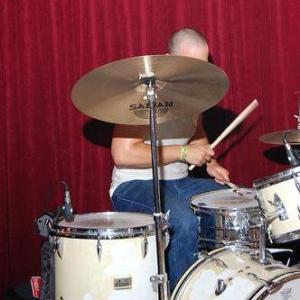
[interruptive but brief discussion about a gold watch ensues]
JOSH: …What am I trying to say? We were in England recently, and there's this new movie called "This Is England"…
Yeah, I think I saw a poster for that.
JOSH: Yeah, it's a decent movie, I actually downloaded it and watched it. It kind of like, shined the light on the skinhead culture. It was one of the few working class, punk cultures that was really thriving, really mainstream. In the U.S. it's kind of getting recuperated as this memory, which happens in punk from time to time, and [they've] finally done it to the skinhead/Oi! scene.
I don't think we really have any relation to that, but it's kind of an interesting thing to watch. I think every sector of punk and hardcore eventually gets swallowed up, and re-broadcasted in a new way.
But I guess for us, it's [just] a [mostly musical case] and some kind of aberration for the kind of aesthetic they had.
Your new 12" Year of the Pig looks at violence against women and rights for sex workers. I'd like to talk about that for a bit. In an idealistic society where employment is available for everyone -- do you believe women would still choose to take on a career in this area? In other words, do you believe prostitution can be a self-imposed choice as opposed to limited employment opportunities in a class-dominated economy?
SANDY: Yeah, I think women that are in the sex industry are in there, for the most part, by choice. I haven't done that much research -- I don't know what the stats are, what their backgrounds are, but I think generally people choose to do what they do. Bottom line.
JOSH: It's a supply and demand thing. Prostitution's been around in society for as long as history. [There's] definitely a lot of women who are pushed into it against their will; there's a huge issue of trafficking all over the world; and [there's] sexual slavery that goes on. And at the same time, there's people who go into it because it's a really lucrative business. Some women find it empowering, so I think there's a really broad spectrum of people that are involved in it. And despite it being populated by all these
I think most bands have a gimmick of some sort, whether it's subtle or really obvious. I think Fucked Up is kind of a combination of the two.
different kinds of people, there's still a really scapegoated image of prostitutes as either somebody who's been pushed into it against their will, or somebody who's just a crack fiend and has no other choice but to sell their body. In the most ideal society, there would be a thriving prostitution industry that was self-managed; where people had a respect for women who did it as a career they were choosing to do. There's always gonna be people -- men, women who want to buy sex. I don't think it's ever really gonna fade away.
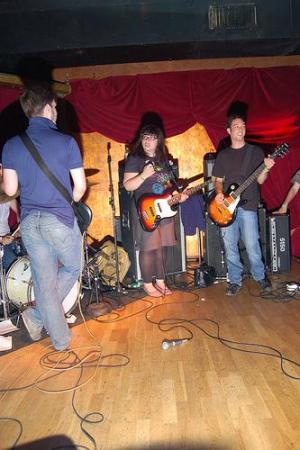 What rights would you seek for sex workers?
What rights would you seek for sex workers?
JOSH: The Year of the Pig is based on that kind of [specific] issue. And we just did a benefit in Toronto for a group called the Sex Professionals of Canada. I think their approach to the whole thing is a pretty decent one, which is, they want decriminalization as opposed to legalization; there's some nuances in that. [That is], there wouldn't be any type of formal governments, sanctions, or un-sanctions -- like monitoring of the industry. People would be able to start brothels, organize things on their own behalf. It's kind of a refreshing view for the way a lot of people look at politics and economies right now. So I pretty much agree with what they want to do, which is to get Canada [doing the aforementioned]. There's all these places in the world, like New Zealand and a couple states in Australia that have decriminalization as they want to see it.
SANDY: Amsterdam too, right?
JOSH: No, see Amsterdam is legalization where they have red light districts, and for that you have to buy permits [and] licenses, and it's a really government-intensive thing where people are just kind of getting exploited in a different way.
As a fairly related topic, how do you feel about the female involvement in modern hardcore and for that matter, punk rock in general?
SANDY: …I play in this band because we've all known each other for a very long time. I don't think I was sought out for being a girl, though, I could see maybe a benefit of having me in the band to sort of show audiences that it can happen and it can be cool and it can be totally fun and comfortable. There aren't a lot of girls playing music, and I'm not really sure why.
I have a tough time talking about this topic -- I haven't fleshed out in my head exactly why there aren't so many women in music, like this kind of music. Secondary to that, I like different kinds of music as well, not so much the aggression you see in hardcore and punk and I think that's maybe why girls aren't attracted to [this] kind of music because it's a pretty aggressive form. I think generally, maybe women are not so into…I don't know, I'm just generalizing there. But that would be my reasons.
Do you believe it could be related to America's general history of male[-led] domineering, or--?
SANDY: Oh, of course, that goes without saying.
I don't really see much of a change [, either]. I mean, sure, there are a lot of girls participating in other aspects of punk -- you know, photographers, or zines, or media-related / behind the scenes aspects of it, [but] not so much on stage. Maybe that [comes from] men wanting to flaunt their assets physically -- [sighs] -- on the stage and, you know, show their prowess by rocking out and attracting females, but…I don't know. It's kind of a bad answer I guess.
What about general, ignorant chauvinism due to the strong presence of such young people in bands and/or at shows?
SANDY: Well, hopefully, if youth are coming to shows where there is more of a female representation, then maybe the next generation will not see such a divide. I think there is progress. There are a lot more women in bands now than there were 10 years ago.
What do you think can be done now to help balance gender involvement more?
SANDY: I don't know. My mom had a girl, and this girl grew up, and befriended a bunch of kids in punk, and they happened to be in a band. It's actually pretty random. Uhh…yeah. [laughs]
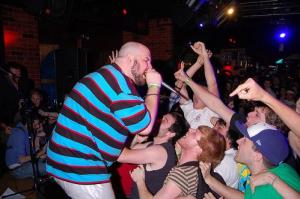 You tend to play with a lot of hardcore bands that are influenced by the same decade and/or classic type of bands. How do you feel about the more modern hardcore bands you play with, whose sound a lot of people would likely not link to the `80s as immediately as they would you, or Career Suicide. Say, Modern Life Is War for example. I know you're playing with them soon or you just played with them.
You tend to play with a lot of hardcore bands that are influenced by the same decade and/or classic type of bands. How do you feel about the more modern hardcore bands you play with, whose sound a lot of people would likely not link to the `80s as immediately as they would you, or Career Suicide. Say, Modern Life Is War for example. I know you're playing with them soon or you just played with them.
JOSH: I don't know. I mean, all hardcore, all rock music basically -- as a reference, punk pretty much in every way has been a dominant guide to the way that rock music's developed. So bands like Modern Life Is War still…if it's not like a thrashy, `82 mosh punk band, they're still…you know, it's like New York City hardcore from the `80s. Mosh bands.
I don't see a divide so much, [there are] bands that really craft their sound around a really retro sound, and bands that are crafting more around a `90s sound, but it all pretty much comes from the same place. And that's just personal taste. [smirking] So I won't say anything.
Are you ever afraid of becoming that gimmick band that people come to see because of what you do and not what you play? Like, I read an interview with the Dillinger Escape Plan vocalist who said he stopped breathing fire because he didn't want people saying, "Let's go see that band! The dude breathes fire!" I can [imagine] there might be some kids who go, "Let's go see that band Fucked Up! I heard the singer bashes the mic into his head until he bleeds."
SANDY: Well, playing music and showing your craft to people, you're kind of automatically a performer and you can't really control if people are coming to see you for the music or for anything else that you bring to the table. Whatever people's intentions are, I'm not going to judge them -- because I've been to some shows where I appreciated the band's live show as a whole more than their music. But I don't think that's wrong.
JOSH: I think most bands have a gimmick of some sort, whether it's subtle or really obvious. I think Fucked Up is kind of a combination of the two. We have some really subtle gimmicks -- more about the record and the artwork and stuff that we put on them. And then there's the live gimmicks of Damian or whatever.
But I think most bands have gimmicks. [Some] get labeled really quickly as gimmicks, and other ones, the people are real. None of it really seems that real anymore -- everything is kind of a gimmick to me.
SANDY: At the end of the day, it just adds interest to the overall package. I can't recall loving a band that didn't have any sort of interesting hook. So I think it's sort of a necessity.
JOSH: That being said, I think the punk scene is one of the few remaining scenes that even if it's just a small part of it, like it exists without relying on gimmicks, it has people who truly like the music or truly like the message of a band, or just find a cathartic hardcore show and jump around [at]… There's not really a lot of other scenes that don't ride on that gimmick or that kind of fashionability, and I think whatever you can say about punk, there's still that current that kind of defines it, and that makes it a cool place to be.